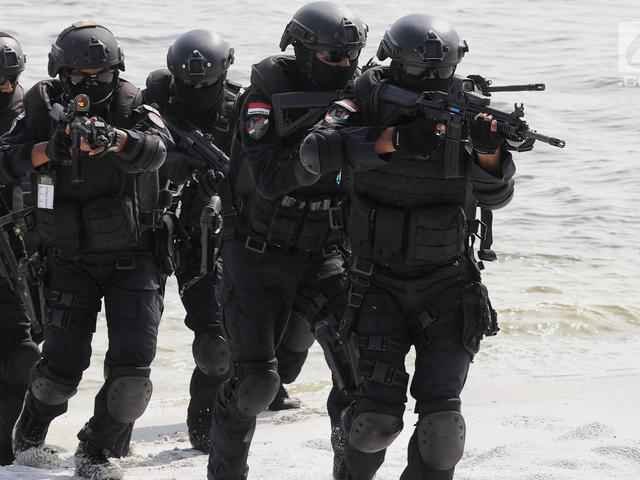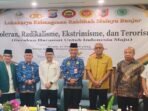Banjarmasin – Komnas HAM has sent letters and policy papers related to the Draft Presidential Regulation on the involvement of the TNI in dealing with acts of terrorism to the President and DPR. From requests for involvement in the prevention, prosecution and recovery of acts of terrorism. Komnas HAM only recommends involving TNI in dealing with high-scale threats (terrorism).
“The police are unable to handle high-scale acts of terrorism,” said the Commissioner for the National Human Rights Commission, M Choirul Anam SH, in an Academic TV webinar in collaboration with the Antasari State Islamic University, Banjarmasin, Saturday (14/11/2020).
Anam emphasized that in overcoming the threat of terrorism in Indonesia, the framework of criminal justice (criminal justice system) is appropriate. Law No.5 of 2018 has comprehensively regulated the handling of terrorism, starting from prevention, prosecution and de-radicalization, including fulfilling the rights of victims of terrorism.
“The draft of Presidential Decree has the potential to conflict with existing laws, causing overlapping laws, therefore it needs to be corrected,” he said.
As a suggestion, Komnas HAM according to Anam, said that the government must explain the scale of serious threats that allow TNI involvement in prosecution, correct provisions regarding TNI funding sources from the non-APBN budget, and ensure that the deployment of TNI as a form of Military Operations Other than War (OMSP) is carried out based on political policies government, not directly decided by the TNI Commander.
Another speaker, Jalaluddin, M.Hum., Ph.D, Dean of the Faculty of Sharia UIN Antasari reminded the need to be careful in assigning the TNI to overcome acts of terrorism. Jalaluddin stated that “Assigning the TNI to deal with acts of terrorism is considered (public) excessive, has the potential to disrupt the criminal justice system, threatens human rights, democracy, so that it has the potential for overlapping powers and functions of other institutions.”
However, it cannot be denied that because terrorism is a global threat and there are levels of threats that cannot be overcome by the police, the TNI needs to be involved. Jalaluddin provides a limitation according to International Humanitarian Law, that the arrangements in the Draft Presidential Regulation should be directed at the TNI assignment for terrorism in regional and border areas, not at domestic.
Jalaluddin also reminded that the involvement of the TNI that was not carefully regulated and had the potential to cause human rights violations. Based on past experience, this can have a negative stigma effect on the state and an embargo on the military. As a result, our modern weaponry cannot be used or repaired because there are no spare parts due to the embargo. “So it is necessary to set a specific situation scope to involve the TNI which does not cause problems,” he said.
Dardiri, MA, Alumni of Mc.Gill University Montreal and Doctoral Candidate of Sociology at Padjadjaran University in his presentation stated the importance of maintaining the image of TNI reform in regulating military involvement in combating terrorism.
“The criminal justice model approach places terrorism as a violation of the law, so it needs countermeasures through law enforcement. This approach is to prioritize peaceful, accountable methods (accompanied by demands for accountability reports), upholds human rights principles and tends to gain legitimacy from the community,” he said. Dardiri said, the war-model approach views terrorism as an action that threatens the political structure and existence of a country, so it needs to be fought. As a result, a stereotyping the opponent, in the form of a war declaration and aiming to win, has the main tendency to finish off the opponent and it is possible to have collateral damage.
“The involvement of the TNI is only needed as support for the Police. It is involved based on a substantive measurement – about why and when it should be involved. So it requires clear coordination rules between agencies without disturbing the flexibility of strategy. And we still have to uphold the principle of upholding the honor and dignity of the TNI as an element of national defense,” he said.
Prof. Dr. H. Ahmadi Hasan, MH, Professor of Law at the Faculty of Sharia, UIN Antasari, stated that the debate about the involvement of the TNI which is pro or contra is the impact of its global threat. “There are many activities that require more community involvement in prevention. It is better for those who have been exposed to take a persuasive approach rather than be dealt with harshly,” he said.
Anang Fadhilah











